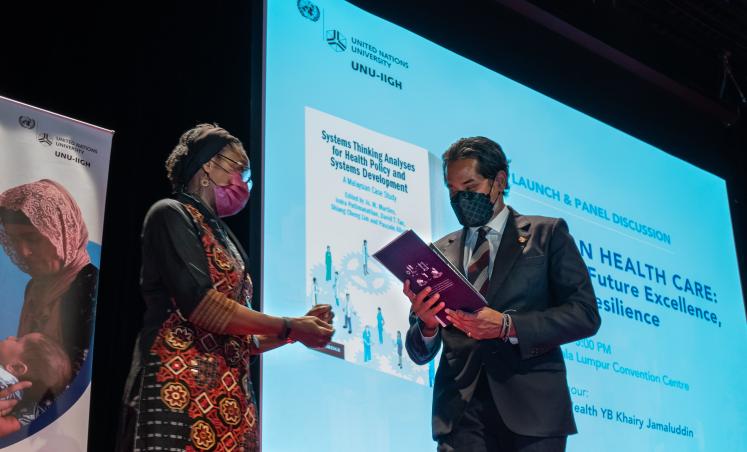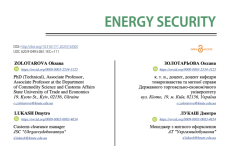⏯️ Watch the highlights here
KUALA LUMPUR, 28 March 2022 — Six decades since its independence, the Malaysian health system has evolved from being a rudimentary system that was initially focused on expanding access to basic healthcare and reducing premature mortality to one that is highly developed and much more complex.
The United Nations University International Institute for Global Health (UNU-IIGH), the UN think tank on global health, has coordinated a study that has documented this transition and published it in the book “Systems Thinking Analyses for Health Systems Policy and Systems Development: A Malaysian Case Study”.
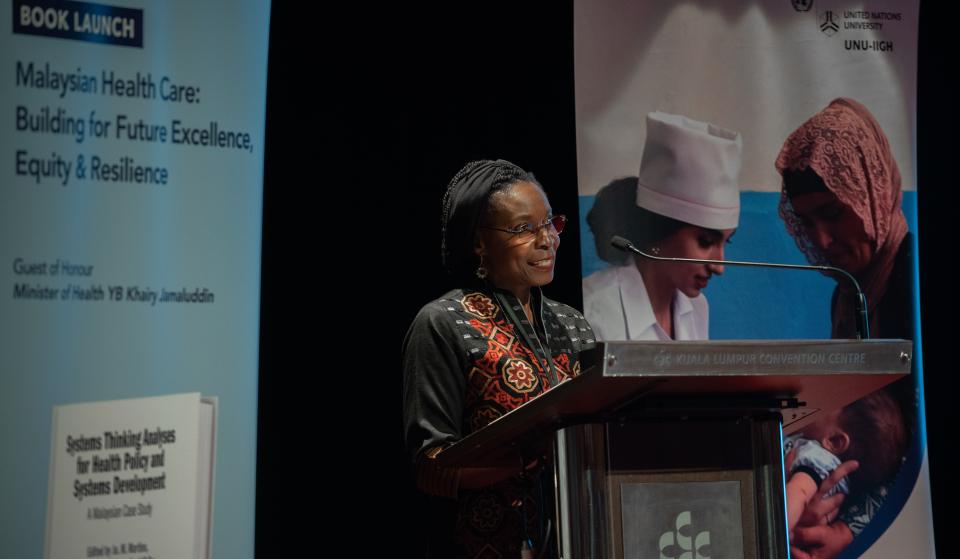
The book was launched on 28 March in an event graced by the Minister of Health YB Khairy Jamaluddin who gave a keynote speech.
The Minister lauded the Institute for its work on the publication. “This book comes at a very important period. Having seen the gaps in our healthcare system and the piecemeal changes that do not bring sustained and proper reform, now we have to look at healthcare reform in a systemic manner — by looking at the various moving parts, the consequences to policy and programs, and the feedback loop mechanisms. We’ve learned a lot from the publication that we launched today,” said YB Jamaluddin.
Further, the Minister announced that the lessons from the book will be useful in a whitepaper, which the Ministry is working on as basis for a long-term, systemic reform for the healthcare system in Malaysia, which is due for presentation to the Parliament this year.
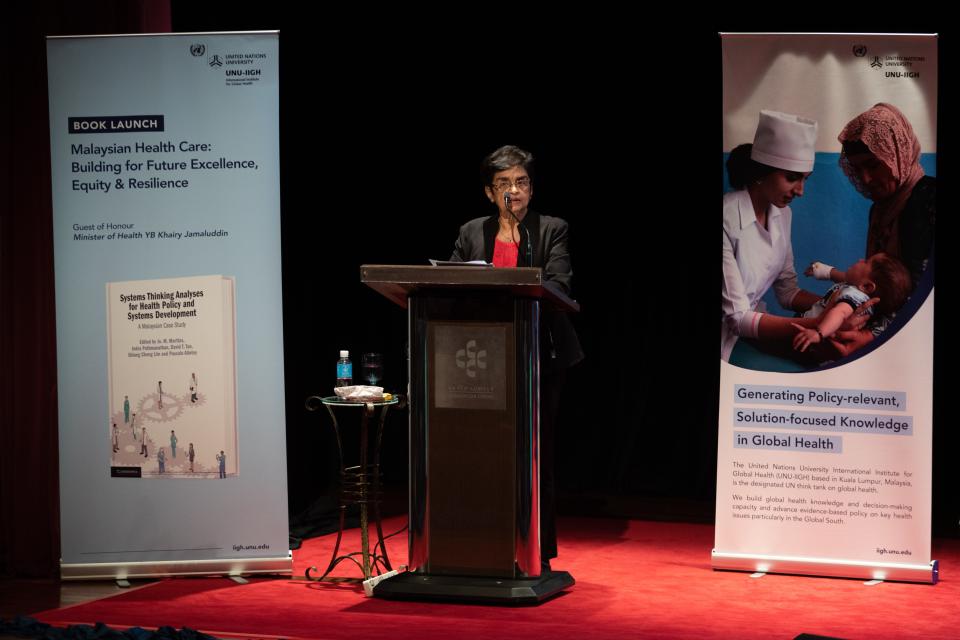
Prof Pascale Allotey, UNU-IIGH Director, presented the book to the Minister, and acknowledged the many contributors to the book including Malaysian researchers and academics, as well as current and former staff from the Ministry of Health.
A culmination of a multi-year effort, the book also offers an analysis of the current healthcare needs and demands of the health system and the Malaysian population. While highlighting the strengths of the system, it also presents examples of challenges faced by the health sector such as the recent crises in the employment of doctors, dentists and pharmacists, and the lack of effective coordination and synergy between the public and private sectors.
The book launch was accompanied by a panel discussion about the future of the Malaysian healthcare system moderated by UNU-IIGH Research Lead Prof David McCoy. Panelists Prof Jomo Kwame Sundaram (Khazanah Research Institute), Ybhg Tan Sri Dr Jemilah Mahmood (Sunway Centre for Planetary Health), and Tan Sri Dato’ Dr Abu Bakar (International Medical University) shared their perspectives on public and private healthcare financing and delivery in the country, and on the lessons drawn from COVID-19 that can help the Malaysian health care system prepare for future shocks and crises.
The book was edited by Indra Pathmanathan, David Tan, Shiang Cheng Lim, Jo Martins and Pascale Allotey, and published by Cambridge University Press. Available at https://collections.unu.edu/view/UNU:8286.
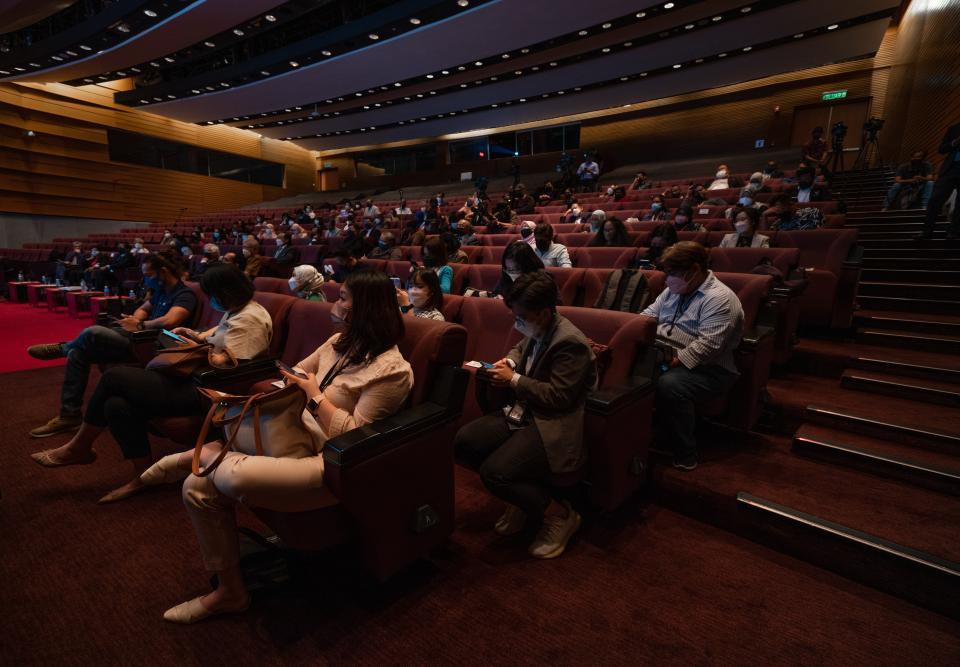
More about the Book
Systems Thinking Analyses for Health Policy and Systems Development: A Malaysian Case Study
Health systems are fluid and their components are interdependent in complex ways. Policymakers, academics and students continually endeavour to understand how to manage health systems to improve the health of populations. However, previous scholarship has often failed to engage with the intersections and interactions of health with a multitude of other systems and determinants. This book ambitiously takes on the challenge of presenting health systems as a coherent whole, by applying a systems-thinking lens. It focuses on Malaysia as a case study to demonstrate the evolution of a health system from a low-income developing status to one of the most resilient health systems today. A rich collaboration of multidisciplinary academics working with policymakers who were at the coalface of decision-making and practitioners with decades of experience, provides a candid analysis of what worked and what did not. The result is an engaging, informative and thought-provoking intervention in the debate. This title is Open Access.

